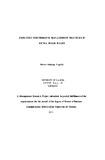| dc.description.abstract | The study sought to establish employee performance management practices in Kenya
Sugar Board in Nairobi. Chapter one focused on the importance of performance
management, performance management, and employee performance management.
Further more an overview of employee performance management practices was outlined.
Chapter two outlined an in depth definition of performance management as well as
benefits of performance management to an organization. Employee performance
management practices such as performance agreements / objectives, reviewing
performance, rewards, training and development, employee development, career planning
as well as development and career planning were described in detail.
Chapter three elaborated research methodology used in this study. Descriptive case study
was used to establish employee performance management practices in Kenya Sugar
Board in Nairobi. It was used because the research problem required detailed
investigation of the Kenya Sugar Board. Primary source of data was used in this study.
Three departments were involved in this study namely planning, Agriculture and Human
Resource. Data was collected using an interview guide. Data collected was analyzed
using content analysis technique.
The results of this study revealed that employee performance management practices are
used to enhance the performance of individual employees and teams. This ultimately
improves the overall organization performance by attaining key strategic goals. Equally,
the findings indicated that employees were involved in setting and owning objectives.
Additionally, appraisals were done once a year, with training and development being
used to address needs assessment. From this study, it was observed that career planning
was being used to manage employee expectations. Rewards were used to encourage
effort and desired behaviour, although they were mainly monetary. | en_US |



